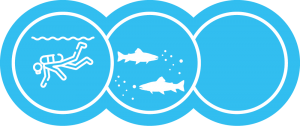The site
The Patroklos area has everything you might dream of for the perfect vacation in Greece: crystal sea waters, a warm climate, a tiny, unspoiled islet dominating the landscape, an archeological area right in front. And a treasure to be discovered underwater: plenty of corals, fish, monuments, and even a shipwreck site and a car cemetery – in short, a paradise for scuba divers.
The Skironis aquaculture farm is located just nearby. In the recent past, the local community was dividedabout it, with some locals being concerned that the beauty of the landscape might be disturbed, preventing a further growth of the local touristic industry.
The challenges
Although this sounds simple, there are also challenges which UNITED activities will address. Is this combined use of the marine space feasible under existing laws? How close to the farm, and how deep, can scuba divers go? For example, at present a certification is required for trained scuba divers to repair nets. In addition, it is not known whether farmed fish is going to be stressed by visitors. In UNITED, stress factors in fish will be monitored, and cameras will be used to observe their behavior.


